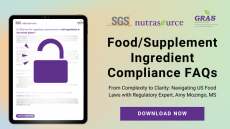IFT FIRST: Mintel shares four mind-boosting ingredients for brain-health claims

“We see 40% of consumers say that they would like their diet to support healthy brain function. So, there is interest there in terms of really eating for your mind and eating right to help support that. But when it comes to seeing brain-health claims -- is that something consumers are ready for yet? And I do think that we have a way to go before that is the number one thing that consumers are looking for, but I do think there's a lot of opportunity.”
B vitamins to adaptogens: What’s good for the brain?
While not as popular or as widespread as heart and immune health claims, the food and beverage industry “have to do some things to support [consumers] and get them interested and engaged with this area” of brain health, Mattuci said.
"One way to do that is by starting with familiar foods and ingredients," Mattuci said. "[Dole's Berry Spark product] is talking about how it's your brain and cognitive support. It's giving you memory and focus support, but it's really using familiar ingredients really playing off the antioxidants in those fruits. They're something that's familiar; that's going to be reassuring to consumers, even if the idea of the brain health claim is new to them."
And when it comes to creating product with brain health claims, Mintel has found four ingredients where CPG brands should focus their attention:
- Caffeine alternatives: While consumers are already familiar with the benefits of caffeine for alertness and focus, some consumers don't want the jittery and anxious side effects, Mattuci explained. By "pairing a theanine with caffeine, [it] can help with the focus, the cognition without some of the side effects," and ingredients like matcha can provide "a really high amount of theanine," she said. Other ways to cut down the caffeine level for consumers is by creating hybrid products of regular strength and decaf coffees, she added.
- B vitamins: CPG brands can call out "different natural sources of B vitamins ... [as] another way to engage with consumers and give them that trust," Mattuci said. Calling out the brain-health benefits of ingredients like vegetables and millets can be one way that consumers get used to the idea that what they eat can improve their brain health, she explained. Similar to coffee alternatives, blending ingredients like B vitamins with caffeine, ginseng, zinc, or other minerals can be a way of demonstrating the brain health benefits of a product.
- Adaptogens: Adaptogens are an increasingly important functional ingredient in food and beverages. However, "we see only 7% say that they currently eat or drink a food or drink product with an adaptogen," Mattuci said. So, CPG brands will need to educate consumers on the relaxation and other benefits of adaptogens. Non-alcoholic social tonics can be one way to demonstrate those benefits, she said. Ingredients like ashwagandha, tulsi, schisandra, and brahmi are several adaptogens for brain health, she added.
- Choline: Lastly, choline is an important ingredient when it comes to childhood development, but it's also important for adults, and CPG brands can do more to show consumer the brain health benefits of the ingredient, Mattuci said. "In fact, 90% of adults in America ... were not getting enough choline in our diet. It's been a nutrient that was singled out in ... the 2020-2025 Dietary Guidelines [as] a nutrient of concern," she added. Currently, choline appears in baby formulas, snacks, and cereals.


![[Video] CarobWay demonstrates low caloric, functional properties of carob fruit at IFT FIRST 2023](/var/wrbm_gb_food_pharma/storage/images/_aliases/wrbm_medium/publications/food-beverage-nutrition/foodnavigator-usa.com/news/suppliers/video-carobway-demonstrates-low-caloric-functional-properties-of-carob-fruit-at-ift-first-2023/16632324-1-eng-GB/Video-CarobWay-demonstrates-low-caloric-functional-properties-of-carob-fruit-at-IFT-FIRST-2023.png)


















